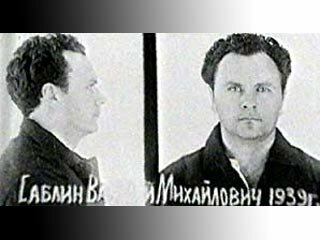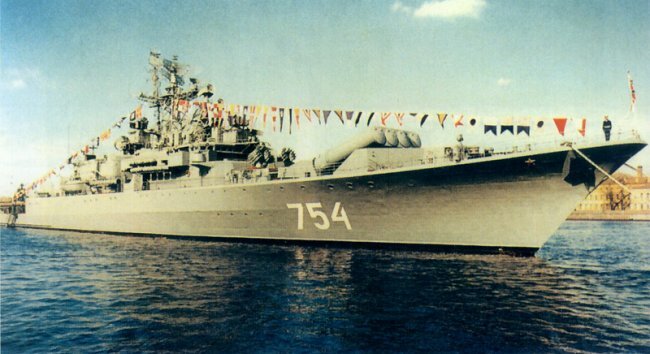1975 year, the revolt on the Watchtower
The events of 8-9 November 1975 of the year on a large anti-submarine ship (BOD) "Watchdog" the general public know very little. The Brezhnev authorities cowardly concealed political action on a warship from the people. The decaying Soviet nomenklatura did not need heroes and revolutionaries. They needed the tops and cogs of the system. The Soviet army and the navy of those years nurtured and elevated to the top just such. Sharkuns, generals, careerists, officers and hypocrites, political commissaries have spoiled the beautiful image of the Soviet soldier. It is no coincidence that 16 years later, our valiant defenders of the Motherland uncompromisingly swallowed the collapse of the Soviet Union and allowed the traitorous rulers and frantic "first wave democrats" to hang themselves out in the shit and actually destroy our army as such. However, there was an honest and courageous man among them who already, in the middle of 70's, understood that the marasmatic CPSU leads the country to the abyss. Captain III rank, deputy commander of the BOD "Watchdog" Valery Sablin, at the cost of his life, tried to open his eyes to compatriots at the rottenness and worthlessness of the Brezhnev regime.
 Shortly before midnight from November 8 to 9, the watch officer of the submarine on duty in the raid on the Daugava River in Riga, where the ships of the naval parade stood in honor of the October Revolution holiday, noticed a man at anchor barrel waving his arms. He was removed and taken on board the submarine. He informed the boat commander, Captain II Rank Svetlovsky, that he, Senior Lieutenant Firsov, had escaped from the BOD Watchdog to report a riot which had been raised by the commander of the ship, Captain III rank Sablin. According to the fugitive, he arrested the commander and was going to hijack the ship.
Shortly before midnight from November 8 to 9, the watch officer of the submarine on duty in the raid on the Daugava River in Riga, where the ships of the naval parade stood in honor of the October Revolution holiday, noticed a man at anchor barrel waving his arms. He was removed and taken on board the submarine. He informed the boat commander, Captain II Rank Svetlovsky, that he, Senior Lieutenant Firsov, had escaped from the BOD Watchdog to report a riot which had been raised by the commander of the ship, Captain III rank Sablin. According to the fugitive, he arrested the commander and was going to hijack the ship.Svetlovsky did not believe this trembling from cold, or from fear, or from a hangover man. He knew Sablin. Although he was a commander, but an excellent sailor, not an upstart, not a careerist, went through all the steps of naval combat service, he could have become a ship commander himself, but he chose to become commissar. Sablin was a political commander by vocation: he believed that revolutionary thoughts were pure - they were dirty, distorted, and the scoundrels who clung to the revolution became insignificant. He entered the Military-Political Academy, breaking his commanding career, only to better know the revolutionary theory. Perhaps he regretted this step, but not because of a ruined career: on one of the ships where he had the opportunity to serve, Sablin did not encounter such a pack of notorious opportunists, as in the auditoriums of the political academy. But Sablin did not spoil in their midst. Stubbornly continuing to take notes on the classics of Marxism, he wrote down a quote from Berdyaev in the margin: "A person can and often must sacrifice his life, but not his personality."
While the commander of the boat was thinking, a report of the watch officer followed: "Watchdog" was removed from the anchor!
Learning about Firsov's escape, Sablin did not change his decisions. The suddenness was lost, but it was too late to retreat, the bridges were burned. Having left the anchor, the BOD unexpectedly left the parade building of ships, miraculously turned around in a narrow river and, picking up speed, moved into the Gulf of Riga. Radiograms rushed from the ship to the air to the central party and Soviet bodies, which contained political demands. Sablin announced that he was heading for Leningrad, was going to the Neva to the parking lot of Aurora and demanded that one of the team members give a speech on Central Television and Radio to inform the people what had prompted him to this performance and what the Watchdog crew was seeking.
Baltic Command fleet fell into a state of stupor. Admirals desperately cowardly and did not dare to take any action. However, the rebellion on the warship was impossible to hide, besides, knowing Sablin, they were sure that he would act until the end.
Captain III rank Valery Sablin long had his idea. The plan, invented by him, was adventurous and did not provide for thorough preparation. Zampolit, whose idol served as the lieutenant of the 1 of the Russian revolution Schmidt, was counting on the strength of his word and the revolutionary impulse of the sailors. On the evening of November 8, when the crew watched the film Battleship Potemkin (later the investigation could not determine whether it was a coincidence or whether Sablin had unidentified accomplices on the ship), the deputy commander reported to the captain Potulny that in the radio room they had a terrible drunk. The commander, red with anger, rushed there, but as soon as he was in the radio room, the political officer slammed and secured the door behind him. The crazed Potulny discovered on the table a letter from Sablin, addressed to him, in which the commissioner explained the reasons for his action.
After this, the captain of rank III entered the mess and made a speech to the officers and midshipmen of the Watchdog. They were 29 people (15 officers and 14 midshipmen) versus Sablin alone. Zampolit announced that he took command of the ship and intends to lead him to Leningrad to appeal to the people from there: "The Fatherland is in danger, the authorities are mired in lies, dirt and corruption, we need democracy, freedom of speech, purification." Sablin quoted Lenin, Marx and the revolutionary democrats and said that the Soviet state has no right to depart the spirit and principles of the October revolution. (Later, during the investigation, one of the overwhelming officers at the investigation will show that the captain of the third rank chose quotations tendentiously.) The participants were silent, only a few officers and midshipmen stated that they largely share Sablin's convictions. However, no one wanted to help him lead the ship to Leningrad. Then Valery suggested that everyone who disagrees with him spend some time under lock and key. All 29 people cowardly sank into the hold, so that, after sitting there, continue to write in their questionnaires "was not, was not, did not participate."
Then Sablin turned to the sailors (165 man). He talked about corruption at the top, that the authorities were squandering the national wealth of Russia, ruining the country and its people — you need to speak on television, tell the truth and ensure that the country is led by honest people, not protégés of family political dynasties. During the investigation, a sailor by the name of Shein showed: "After his speech, general enthusiasm began. What we talked about amongst ourselves in the smoking rooms suddenly sounded publicly. It was like a holiday. A sense of dignity awoke in everyone. We felt like people." Of all, only Shein followed Sablin consciously, aware of the consequences. For the rest, it was a minute rush, hope for the realization of a dream, warmed up with a film about the uprising on the battleship. Subsequently, almost all of them will repudiate their “yes” (who voluntarily, who is under pressure) and will convict the political officer. On his side will remain only 18 sailors.
"Watchdog" went to the Gulf of Riga. However, the fugitive failed to go far. At dawn, a chase was sent for him: an air regiment (in full force), ships of the Baltic Fleet, frontier ships of the KGB and boats. In the actions of the haunting side there was a lot of confusion. For a long time could not manage to locate the "Watchdog". The command assumed that Sablin would break into the Swedish territorial waters. Therefore, the BOD waited in the area of the Swedish island of Gotland. The pilots were mistaken several times, taking for the "Watchdog" ships pursuit. In one case, the pilot began to throw bombs at the rate of the border guard ship, to which he responded with fierce anti-aircraft machine-gun fire. Fortunately, past the target, which, incidentally, is not surprising: for the first time, the border guard fired at a combat aircraft, moreover, perfectly controlled.
Around 9 in the morning, 9 in November was a BOD in the Irben Strait. The ship did not respond to the offer to surrender. Storozheviki opened fire on the superstructures. Having received damage, the BOD, however, did not respond. He went further and tried to escape from the strait into the open sea. Sablin did not want bloodshed. Su-24 dropped bombs at the rate of "Sturvy", anti-aircraft BOD anti-aircraft, which could demolish 6 aircraft from 9 in one go, were silent. The best pilot of the air regiment Porotikov (then he received an award for it) put the bomb exactly under the stern. As a result, the screw and the steering wheel were damaged: The Watchdog lost control and switched to helpless circulation. Sablin realized that his idea had failed, the cold, lead Irbensky Strait was the last point of his journey. The boats came close to the side of the ship and landed troops on it. The liberated commander of the BOD Potulny ran up to the bridge and plunged the political officer onto the deck, wounding him in the leg with a pistol. So the revolt on the Watchdog was put down.
Sablina was waiting for the investigation, in which he behaved courageously and resolutely rejected speculation that his goal was to hijack a ship to Sweden. Six months later, he was shot by sentence of the Military College of the court. Thus ended the life of Valery Sablin, an idealistic revolutionary born in the wrong time.
A cassette with fragments of the political officer’s address to the people has survived: “Hello, comrades! I appeal to those who feel the revolutionary past of our country with their hearts, who critically but are not skeptical about the present and who honestly think about the future of our people.” ". We have addressed through the Commander of the fleet to the Central Committee of the CPSU and the Soviet government with the requirement to give one of our crew members to speak on the Central Radio and Television explaining to the Soviet We’re not traitors to the Motherland and not adventurers who seek fame by any means. There is an urgent need to openly raise a number of questions about the political, social and economic development of our country, about the future of our people, requiring a collective, nation-wide discussion without pressure of state and party organs. We decided on this speech with a clear understanding of responsibility for the fate of the Motherland, with a strong desire to achieve communist relations s in our society. "
After the execution of Sablin passed 29 years. Our army and navy were practically destroyed, they were shocked over the military in all imaginable and unimaginable ways, dumped in the mud and thrown out like waste material. However, Captain III Rank Valery Sablin with BOD "Watchdog" is still (!!!) the only officer who has decided to openly speak for the good of the Motherland and in the name of the justice of our society.

Information